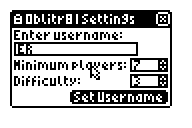I can't understand the fine specifics here, but I wouldn't call this AI until each tank can assess a situation.
- Which tank poses a greater threat (closer tank first then most accurate tank targeting it as the game progresses)
- Tank knows how far off it was from an enemy tank and adjusts next turn accordingly
This is likely for version two, if anything. From what I understood above the AI chooses a tank at random and random settings each turn.
The tanks are on a master graph. Tank A at -30pxls away from the origin, Tank B at +10. Then, each Tank is at the origin of it's own graph. When Tank B fires short of Tank A the value would be, say, 13. If it overshot the value would be -6.
If it was short, it'd either adjust the power up or the angle down. Even Power up*2 and angle up.
Only problem is that you'd have to store values for each tank. So you'd have n-1 lists of n elements denoting accuracy on individual tanks. (-1 for a human player). But, each tank would only have access to it's own list to prevent each tank from targeting the one tank until it's dead then moving on to the next most accurate.
I don't expect that last paragraph to make much sense to anyone else and it probably won't for me in a day. But, how exactly does the AI work in English?
























